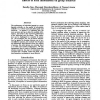Free Online Productivity Tools
i2Speak
i2Symbol
i2OCR
iTex2Img
iWeb2Print
iWeb2Shot
i2Type
iPdf2Split
iPdf2Merge
i2Bopomofo
i2Arabic
i2Style
i2Image
i2PDF
iLatex2Rtf
Sci2ools
111
Voted
AAAI
1996
1996
Effects of Local Information on Group Behavior
Theperformanceof individual agents in a group dependscritically on the quality of information available to it about local and global goals and resources. In general it is assumed that the moreaccurate and up-to-date the available information, the better is the expected performance of the individual and the group. This conclusion can be challenged in a numberof scenarios. Weinvestigate the use of limited information by agents in choosing betweenone of several different options, andconcludethat if agents are deliberately kept ignorant about any number of options, the entire group can convergefaster to a stable and optimal configuration. Wealso demonstrate howa couple of coalition formation schemes improves the rate of convergence and concludethat a variable, rather than fixed, coalition formation mechanismis moreeffective.
AAAI 1996 | Coalition Formation | Coalition Formation Schemes | Individual Agents | Intelligent Agents |
Related Content
| Added | 02 Nov 2010 |
| Updated | 02 Nov 2010 |
| Type | Conference |
| Year | 1996 |
| Where | AAAI |
| Authors | Shounak Roychowdhury, Neeraj Arora, Sandip Sen |
Comments (0)

